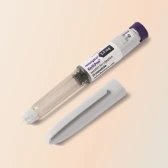Aronne, Louis J, et al. “Continued Treatment with Tirzepatide for Maintenance of Weight Reduction in Adults with Obesity: the SURMOUNT-4 Randomised Clinical Trial.” JAMA, vol. 331, no. 1, 2024:38-48. https://jamanetwork.com/journals/jama/fullarticle/2812936
The weight loss injections currently on the UK market all work by acting like the body’s natural hormones, which makes you feel full. Namely, they mimic GLP-1—though Mounjaro weight loss injections also act like the hormone GIP.
But now, Zealand Pharmaceuticals (in collaboration with Roche) is developing a new medicine that behaves like the hormone amylin. It’s called petrelintide and it’s not available yet. Here’s what we know about how it works, its benefits and when it might be approved.
What is petrelintide and what is it used for?
Roche and Zealand Pharma’s petrelintide is a medicine that’s being developed for weight loss and type 2 diabetes.
We mentioned just now that it works by acting like the hormone amylin, which makes you feel full (more on this below!).
Clinical trials are still going on, which means that petrelintide isn’t approved yet and a clinician can’t prescribe it to you. But early results show that it can drive up to 8.6% weight loss after 16 weeks.
What class of drug is petrelintide?
Great question. Petrelintide is a type of medicine called an amylin analogue. That means that it’s designed to act like the amylin our body naturally produces—and therefore, it brings on the same effects as amylin.
Made by the pancreas, amylin plays a super important role in controlling our appetite and metabolism.
Is petrelintide a peptide?
In a word: yes.
Peptides are short chains of amino acids, which are molecules your body uses to make proteins. And proteins do loads of important jobs, from muscle growth and repair to regulating your hormones.
Petrelintide is a synthetic peptide, meaning that it’s made in the lab and not by your body. It’s very similar in structure to amylin, which is a peptide hormone (i.e. a hormone that’s made of a small chain of amino acids).
By the way: Mounjaro, Wegovy, and Saxenda weight loss injections are all peptides, too.
How does petrelintide work for weight loss?
We’ve mentioned that petrelintide works by bringing on the effects of amylin, a hormone released by the pancreas. Here’s a closer look at how it supports weight loss:
- Amylin primarily acts on parts of the brain that control appetite and food intake, to help you feel full and to keep cravings at bay. One thing that happens here is that you become more sensitive to the hormone leptin, which works to reduce hunger and control energy expenditure.
- Amylin also slows down your digestion, which means that food takes longer to leave your stomach. This keeps you feeling fuller for longer.
- Plus, amylin helps to regulate your blood sugar. Not only can this be beneficial for people with type 2 diabetes, but it helps with weight loss because excess blood sugar can be stored as fat.
Is petrelintide safe? What we know so far
We’re still learning about petrelintide. And we can’t confirm that it’s safe and effective until all clinical trials have been completed and a regulator gives it the green light.
But early research suggests that petrelintide is well tolerated. No serious or severe side effects have come up in clinical studies so far.
In the phase Ib trial, all gut-related symptoms were mild aside from one instance of moderate nausea and another of vomiting, both in the same participant. Up to a third of people on petrelintide had nausea, while constipation and diarrhoea were also reported.
However, we don’t have any data on petrelintide’s long term effects just yet.
Petrelintide vs other weight loss drugs
So how does petrelintide compare to weight loss medications that are currently available?
Before we dive into the research, we want to remind you that there’s no such thing as the “best” weight loss injection—there’s only what’s best for you. Everyone responds to medication in their own way, so if your experience looks different to the below then that’s absolutely fine.
Effectiveness
It’s hard to say which weight loss medication works best without a direct comparison study, since most trials test each drug separately in slightly different conditions, for different durations.
Here’s what the research shows so far:
- Petrelintide (phase I trial): People lost an average of 8.6% of their starting weight after just 16 weeks.
- Mounjaro (tirzepatide): Average loss of 20.9% after 72 weeks.
- Wegovy (semaglutide 2.4 mg): People lost 14.9% on average after 68 weeks.
- Wegovy (7.2 mg): In a new trial, people taking a higher dose of Wegovy achieved 20.7% weight loss over 72 weeks.
Side effects
When it comes to side effects, Zealand pharma has claimed that petrelintide is better tolerated than currently available GLP-1 medicines.
This might be the case, but we need more evidence to say for sure. For instance, there weren’t any serious or severe side effects in early petrelintide trials, while these have been reported on rare occasions for Wegovy and Mounjaro. But we have much more data on the latter two medicines.
Side effects support at Voy
"At Voy, this number is significantly lower - less than 1%. We offer loads of support for managing and treating your side effects, and if you’re ever concerned, you can hop on the phone to our clinical team for advice. It’s all about finding the perfect dose that balances the benefits of treatment while keeping the side effects at bay - we can help guide you to find this sweet spot."

Your weight loss journey
We know that it’s exciting to learn about new weight loss medicines on the horizon. But if you’re looking to take the next step in your weight loss journey right now, there are plenty of options that can help you reach your goals.
Through our weight loss programme, you’ll get medication posted to you each month plus dedicated support from our team of clinicians and coaches. We’ll work with you to transform your lifestyle—and help you keep the weight off for good.
See if you’re eligible by taking our short quiz. It only takes a few minutes.





















